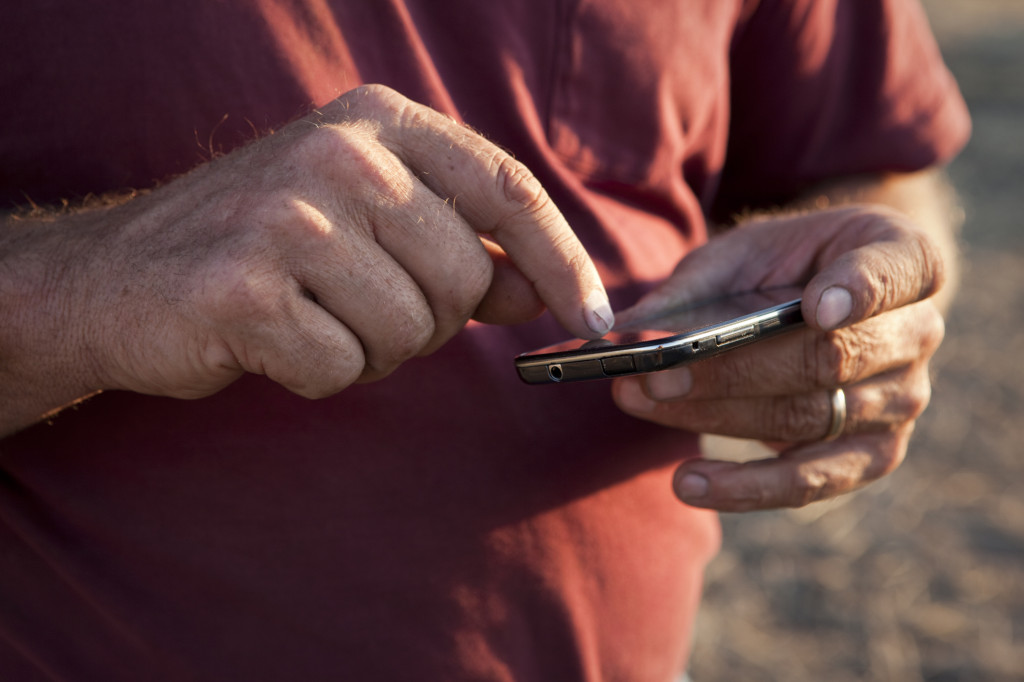A lot of people today use smartphones and mobile app technology to have up-to-date information right at their fingertips, but not every profession, Clyde Fraisse notes, has been quick to embrace these advances.[emember_protected custom_msg=”Click here and register now to read the rest of the article!”]
For one thing, even though there are now smartphone apps specifically made for rural farmers, not all farmers have a smartphone, Fraisse observes. “What I’ve found is that typically it depends on the type of grower, and the commodity they grow,” says Fraisse, associate professor of the Department of Agricultural and Biological Engineering Department at the University of Florida in Gainesville.
“I have been in North Florida, and there you will find growers that grow peanuts and livestock. They are not as up-to-date on this technology, and not all of them have smartphones,” he states. It’s also important to note that some farmers are in such remote parts of Florida that even cell phone technology is tough to come by. “Their ability to get a smartphone depends on where they are,” he points out.
That being said, not all growers do things strictly the old-fashioned way. Going mobile is not just for city folks. At the university, Fraisse is working to help Florida’s agricultural producers use climate data and information to reduce the risks to their crops and increase their profits. Agricultural producers, Fraisse says, can take advantage of what technology tells us about climate science, so they can make better decisions about what they do for their operations.
And getting the most sophisticated statistics about, say, long-term climate projections, means taking advantage of the latest in information technology—including smartphones.
“We’re trying a lot of decision tools, for basically using weather data and climate data for agriculture,” he says. “Last year we started providing some of the information via cell phone, not really smartphones, and we found out the growers really like that. So recently we have started using more sophisticated tools on smartphones. And, of course, it depends on growers having access to these devices.”
University of Florida researchers have built a smartphone app designed to manage irrigation systems for citrus and strawberry growers, available in versions for iPhone and Android-based systems. Fraisse has developed a strawberry irrigation app and web-based climate information systems for growers. They have proven to be popular with some growers, he observes. “Many of them are now using smartphones,” he says. “I think it’s primarily the investment they make in their crops. If it’s a sensitive crop, they may need information in a much more efficient way, and I think that plays a role in it. My feeling is, this is changing very fast. We’ll soon have most growers using them, and that will give us more opportunities to provide information to them.”
Fraisse notes that growers might otherwise need to get this kind of information off the web, but they’re finding that having it instantly available at their fingertips is making a difference. “My impression is that if you need any information that is available, it is available on the web, so typically the grower would have to be at home and on the Internet to get it,” he says.
With the climate information apps that he has developed, Fraisse explains, “It goes straight to their phone and they can be wherever they are, even out in the field, and they will be able to access this information. It’s much more useful to them if they have access to this information all the time. I think that’s the main driver for this. It’s not all types of information; it’s information related to their operation.”
The apps are available through Google Play and Apple stores for free, or through the Agroclimate.org website. “We certainly are investing in this,” Fraisse says. “Our goal is to provide information in the best way possible, and if we have to use smartphones, that is the way to go.”
CREDITS
story by MICHAEL W. FREEMAN
[/emember_protected]

